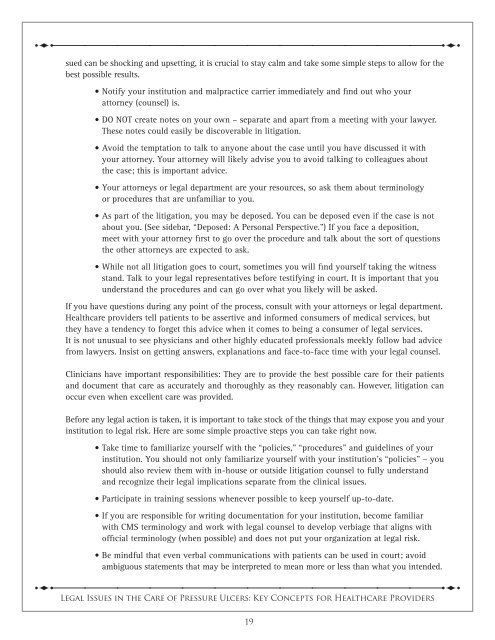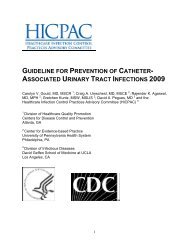sttttttttttttsHere are three examples <strong>of</strong> pressure ulcer bundles:1. The New Jersey <strong>Pressure</strong> <strong>Ulcer</strong> Collaborative was designed to improve patient safety and <strong>the</strong>quality <strong>of</strong> care provided <strong>in</strong> all healthcare sett<strong>in</strong>gs where <strong>the</strong> elderly might develop pressureulcers. Participat<strong>in</strong>g hospitals worked with national faculty and lead<strong>in</strong>g experts <strong>in</strong> pressureulcers and patient safety, and with each o<strong>the</strong>r, over <strong>the</strong> course <strong>of</strong> one year focus<strong>in</strong>g on severaldimensions <strong>of</strong> care <strong>in</strong>clud<strong>in</strong>g assessment, prevention, stag<strong>in</strong>g, pressure-reliev<strong>in</strong>g devicesand nutrition. The mean for all participat<strong>in</strong>g organizations was a 70 percent reduction <strong>in</strong> <strong>the</strong><strong>in</strong>cidence <strong>of</strong> pressure ulcers. 372. The Institute for Healthcare Improvement (IHI) developed <strong>the</strong> “how-to” guide. The 27-pagedocument is a step-by-step set <strong>of</strong> evidence-based guidel<strong>in</strong>es for practical use by cl<strong>in</strong>iciansto prevent pressure ulcers. 383. Ascension Health, a healthcare system with hospitals and healthcare facilities <strong>in</strong> 20 states,created and implemented care methods under <strong>the</strong> SKIN TM bundle. SKIN stands for Surfaceselection, Keep turn<strong>in</strong>g, Incont<strong>in</strong>ence management and Nutrition. The SKIN bundle was tested<strong>in</strong> all <strong>of</strong> Ascension’s acute care and long-term care facilities and has reduced pressure ulcer<strong>in</strong>cidence to about 1.4 per 1,000 patient days systemwide. 8Despite <strong>the</strong> value <strong>of</strong> bundles and systemized approaches, cl<strong>in</strong>icians also must consider <strong>the</strong> uniqueneeds <strong>of</strong> each patient, <strong>in</strong>clud<strong>in</strong>g overall condition, comorbidities, need for immobilization, drugregimen, age and o<strong>the</strong>r factors. Patient management <strong>in</strong>volves balanc<strong>in</strong>g risks. For example, a personat risk for ventilator-associated pneumonia may have to be immobilized <strong>in</strong> a way that <strong>in</strong>creases hisrisk for develop<strong>in</strong>g a pressure ulcer on his head. Such situations should be discussed openly with<strong>the</strong> patient (or family) and documented. The cl<strong>in</strong>ician must respect <strong>the</strong> family’s <strong>in</strong>put but also helpmanage expectations. (See also section 4, “Manag<strong>in</strong>g Expectations and Communicat<strong>in</strong>g <strong>Care</strong>fully.”)Healthcare organizations must determ<strong>in</strong>e which sk<strong>in</strong> care products to use. A lack <strong>of</strong> wound care data(even among new and <strong>in</strong>creas<strong>in</strong>gly advanced products) makes product selection difficult; however,evidence from related fields may guide product selection.Thus, we urge healthcare organizations first to make use <strong>of</strong> bundles, tools, and products already at <strong>the</strong>irdisposal as <strong>the</strong>y ga<strong>the</strong>r evidence for future improvements. Cl<strong>in</strong>icians should create workable pressureulcer guidel<strong>in</strong>es (subject<strong>in</strong>g all such draft guidel<strong>in</strong>es to peer review).What to Do If This Happens to YouLike some pressure ulcers, litigation over pressure ulcers may be unavoidable. For this reason, know<strong>in</strong>ghow to react when it occurs is no less important than know<strong>in</strong>g how to m<strong>in</strong>imize <strong>the</strong> risk <strong>of</strong> pressure ulcerlawsuits <strong>the</strong>mselves.Litigation over a pressure ulcer beg<strong>in</strong>s when <strong>the</strong> pla<strong>in</strong>tiff’s lawyer first appears on <strong>the</strong> scene—when heor she first contacts (even <strong>in</strong>formally) a healthcare provider as <strong>the</strong> patient’s representative. So healthcareproviders must act quickly to defend <strong>the</strong>mselves. At this stage, <strong>the</strong> f<strong>in</strong>ancial <strong>in</strong>terests <strong>of</strong> <strong>the</strong> pla<strong>in</strong>tiffand <strong>the</strong> pla<strong>in</strong>tiff’s attorney outweigh <strong>the</strong> patient’s likely <strong>in</strong>itial <strong>in</strong>terest <strong>in</strong> obta<strong>in</strong><strong>in</strong>g answers. Efforts toapologize or o<strong>the</strong>rwise diffuse <strong>the</strong> situation are generally too late. Although f<strong>in</strong>d<strong>in</strong>g out you are be<strong>in</strong>gstttttttttttts<strong>Legal</strong> <strong>Issues</strong> <strong>in</strong> <strong>the</strong> <strong>Care</strong> <strong>of</strong> <strong>Pressure</strong> <strong>Ulcer</strong>s: Key Concepts for Healthcare Providers18
sttttttttttttssued can be shock<strong>in</strong>g and upsett<strong>in</strong>g, it is crucial to stay calm and take some simple steps to allow for <strong>the</strong>best possible results.• Notify your <strong>in</strong>stitution and malpractice carrier immediately and f<strong>in</strong>d out who yourattorney (counsel) is.• DO NOT create notes on your own – separate and apart from a meet<strong>in</strong>g with your lawyer.These notes could easily be discoverable <strong>in</strong> litigation.• Avoid <strong>the</strong> temptation to talk to anyone about <strong>the</strong> case until you have discussed it withyour attorney. Your attorney will likely advise you to avoid talk<strong>in</strong>g to colleagues about<strong>the</strong> case; this is important advice.• Your attorneys or legal department are your resources, so ask <strong>the</strong>m about term<strong>in</strong>ologyor procedures that are unfamiliar to you.• As part <strong>of</strong> <strong>the</strong> litigation, you may be deposed. You can be deposed even if <strong>the</strong> case is notabout you. (See sidebar, “Deposed: A Personal Perspective.”) If you face a deposition,meet with your attorney first to go over <strong>the</strong> procedure and talk about <strong>the</strong> sort <strong>of</strong> questions<strong>the</strong> o<strong>the</strong>r attorneys are expected to ask.• While not all litigation goes to court, sometimes you will f<strong>in</strong>d yourself tak<strong>in</strong>g <strong>the</strong> witnessstand. Talk to your legal representatives before testify<strong>in</strong>g <strong>in</strong> court. It is important that youunderstand <strong>the</strong> procedures and can go over what you likely will be asked.If you have questions dur<strong>in</strong>g any po<strong>in</strong>t <strong>of</strong> <strong>the</strong> process, consult with your attorneys or legal department.Healthcare providers tell patients to be assertive and <strong>in</strong>formed consumers <strong>of</strong> medical services, but<strong>the</strong>y have a tendency to forget this advice when it comes to be<strong>in</strong>g a consumer <strong>of</strong> legal services.It is not unusual to see physicians and o<strong>the</strong>r highly educated pr<strong>of</strong>essionals meekly follow bad advicefrom lawyers. Insist on gett<strong>in</strong>g answers, explanations and face-to-face time with your legal counsel.Cl<strong>in</strong>icians have important responsibilities: They are to provide <strong>the</strong> best possible care for <strong>the</strong>ir patientsand document that care as accurately and thoroughly as <strong>the</strong>y reasonably can. However, litigation canoccur even when excellent care was provided.Before any legal action is taken, it is important to take stock <strong>of</strong> <strong>the</strong> th<strong>in</strong>gs that may expose you and your<strong>in</strong>stitution to legal risk. Here are some simple proactive steps you can take right now.• Take time to familiarize yourself with <strong>the</strong> “policies,” “procedures” and guidel<strong>in</strong>es <strong>of</strong> your<strong>in</strong>stitution. You should not only familiarize yourself with your <strong>in</strong>stitution’s “policies” – youshould also review <strong>the</strong>m with <strong>in</strong>-house or outside litigation counsel to fully understandand recognize <strong>the</strong>ir legal implications separate from <strong>the</strong> cl<strong>in</strong>ical issues.• Participate <strong>in</strong> tra<strong>in</strong><strong>in</strong>g sessions whenever possible to keep yourself up-to-date.• If you are responsible for writ<strong>in</strong>g documentation for your <strong>in</strong>stitution, become familiarwith CMS term<strong>in</strong>ology and work with legal counsel to develop verbiage that aligns with<strong>of</strong>ficial term<strong>in</strong>ology (when possible) and does not put your organization at legal risk.• Be m<strong>in</strong>dful that even verbal communications with patients can be used <strong>in</strong> court; avoidambiguous statements that may be <strong>in</strong>terpreted to mean more or less than what you <strong>in</strong>tended.stttttttttttts<strong>Legal</strong> <strong>Issues</strong> <strong>in</strong> <strong>the</strong> <strong>Care</strong> <strong>of</strong> <strong>Pressure</strong> <strong>Ulcer</strong>s: Key Concepts for Healthcare Providers19
















